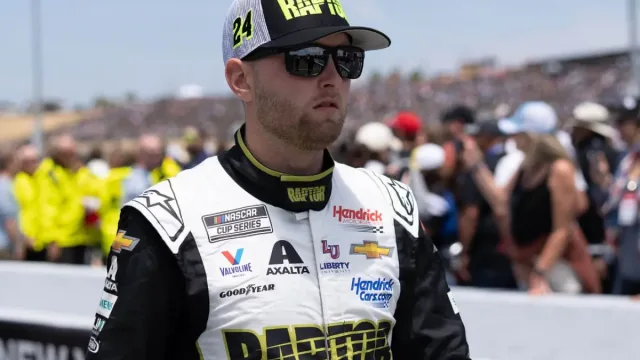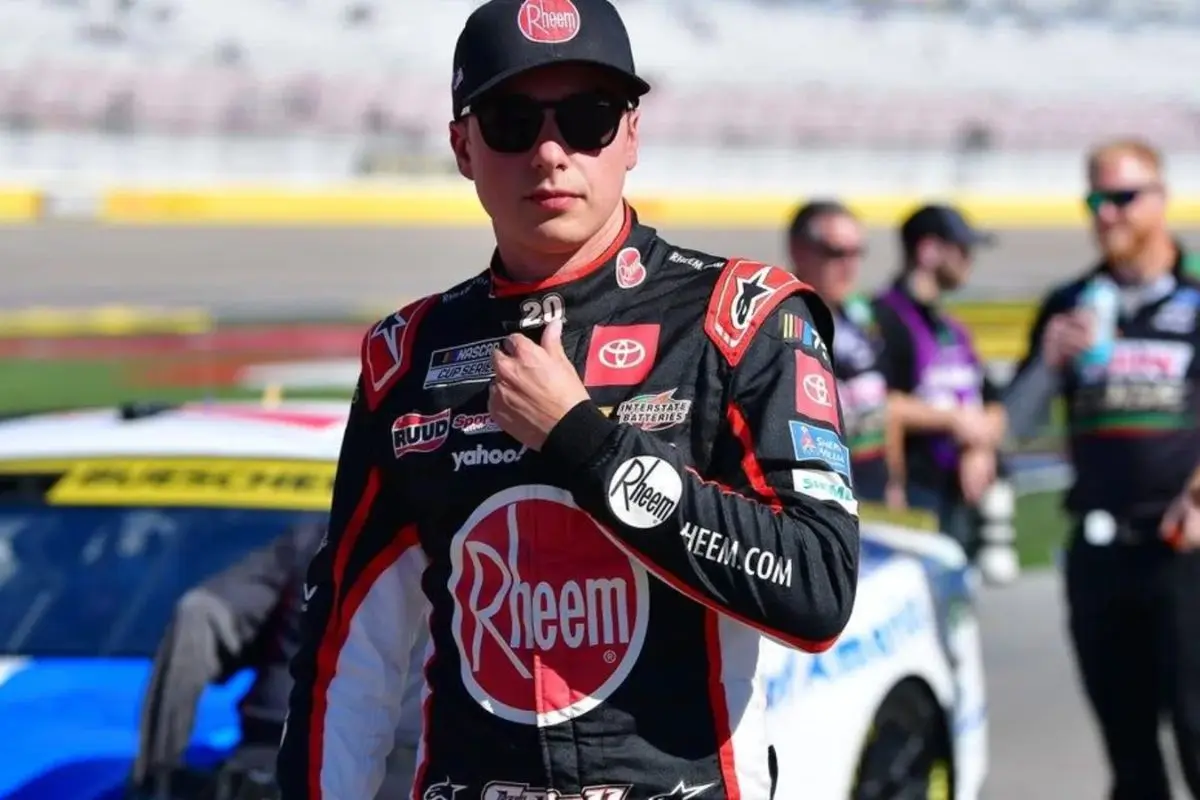NASCAR Chevy Teammates Manipulating the Race? Recent actions by chevrolet/”>Chevrolet teammates, especially Ross Chastain and Austin Dillon, to help William Byron reach the NASCAR Championship 4 have raised concerns among NASCAR insiders. With Christopher Bell’s penalty and struggles, some believe the two drivers may be intentionally blocking to boost Byron’s chances. Radio conversations between Austin Dillon and Ross Chastain suggest they may be working together on purpose, making it hard to tell if it’s just strategy or crossing the line into unethical racing. This has sparked calls for clearer rules, showing how this issue could affect NASCAR’s future.
Key Highlights
- Reports indicate Ross Chastain and Austin Dillon intentionally withheld challenges to assist William Byron’s advancement in the NASCAR Championship 4.
- Austin Dillon’s radio communication revealed a strategy to block for Byron, raising questions about the integrity of their teamwork.
- Christopher Bell’s penalty for safety violations has fueled debates on race fairness and the implications of team tactics in NASCAR.
- Insiders express concerns over potential race manipulation, particularly regarding Bubba Wallace’s actions and their impact on competitors’ standings.
- The situation highlights the need for clearer guidelines on acceptable teamwork practices to maintain competitive integrity in NASCAR.
Christopher Bell Penalized, William Byron in the Spotlight
As the dust settled at Martinsville Speedway, the unexpected turn of events surrounding Christopher Bell and William Byron captured the attention of fans and analysts in a similar fashion. The post-race drama intensified as Bell, initially believed to have secured the final spot in the NASCAR Championship 4, faced a sudden penalty for safety violations. This decision not only altered the course of his season but also thrust Byron into the spotlight, elevating him to a position that many observers deemed controversial.
The implications of Bell’s penalty raised considerable questions regarding the integrity of the race. With Byron advancing amidst this backdrop, speculations emerged around the potential influence of his Chevrolet teammates. Observers scrutinized whether there had been tactical maneuvers that benefited Byron, casting a shadow over the legitimacy of his advancement.
The dynamics of team alliances in NASCAR have long been a topic of debate, and this incident reignited discussions on the extent to which teamwork may inadvertently compromise the spirit of competition.
Byron’s ascension, marked by a mix of relief and unease, was not merely a personal victory; it highlighted broader concerns about race manipulation and fairness in the sport. As analysts dissect these events, the focus will certainly remain on not only the actions of the drivers but also the regulatory framework governing penalties and team interactions.
The unfolding narrative challenges fans and stakeholders in a similar manner to reconsider what constitutes genuine competition in NASCAR, as the line between strategy and manipulation becomes increasingly blurred.
The Strategic Moves of Chastain and Dillon
In NASCAR, tactical alliances can often determine the outcome of races, and the actions of Ross Chastain and Austin Dillon during the Martinsville race exemplify this phenomenon. As the closing laps unfolded, the dynamics shifted dramatically, particularly surrounding William Byron‘s precarious position. With both Chastain and Dillon possessing the speed to overtake Byron, their decision to withhold their challenges raised eyebrows and ignited discussions about tactical collusion among the Chevy drivers.
Chastain and Dillon’s apparent choice to shield Byron from competitors was not merely an act of fellowship; it served a dual purpose. Initially, by maintaining Byron’s position, they collectively enhanced the chances of a fellow Chevy driver reaching the NASCAR Championship 4. This cooperation could be seen as an investment in future team dynamics, fostering goodwill that may pay dividends in upcoming races.
Furthermore, it emphasizes the critical nature of teamwork in a sport where individual skill must often yield to collective strategy.
The implications of their actions extend beyond the race itself. By aligning their strategies, Chastain and Dillon not only influenced the immediate outcome but also set a precedent for how alliances can be utilized in high-pressure situations.
Such tactical decisions, while sometimes veiled in controversy, highlight the intricate balance between individual ambition and collective responsibility that defines NASCAR racing. As the season progresses, the ramifications of these tactical movements will certainly reverberate, shaping both the NASCAR championship landscape and the narrative around these drivers.
Radio Chatter Fuels Speculations of Intentional Blocking
The recent radio exchange between Austin Dillon and his team has sparked intense debate among NASCAR fans and analysts, raising questions about the ethics of race strategy. In the conversation that surfaced, Dillon and his crew discussed a clear plan to assist William Byron by preventing him from losing any positions during the race.
This disclosure has intensified scrutiny regarding the implications of such coordinated efforts among teammates, particularly in a high-stakes environment where every position gained or lost can dramatically alter playoff outcomes. Dillon’s inquiry about the situation was met with a response from his crew chief indicating a full awareness of the plan to shield Byron, further solidifying suspicions of intentional blocking.
View this post on Instagram
This dialogue was perceived by many as a blatant attempt to manipulate race results in favor of Byron, thereby casting a shadow over the integrity of the competition. Prominent NASCAR insiders, including Jeff Gluck, have voiced concerns, questioning whether this collaboration crosses the line into the territory of race manipulation.
The ethical considerations surrounding team orders have always been a contentious topic within motorsports. While collaboration among teammates is not uncommon, the overt nature of this particular exchange raises critical questions about the spirit of competition.
As fans and analysts dissect the implications of such strategies, the line between tactical alliance and ethical racing continues to blur, emphasizing the need for clarity in NASCAR’s regulations and the core values of the sport.
NASCAR Insiders Question the Integrity of Chevy’s Actions
Concerns regarding the integrity of Chevy’s actions during the recent race have emerged prominently among NASCAR insiders, particularly in view of the tactical maneuvers executed by teammates Austin Dillon and Ross Chastain. As William Byron found himself precariously positioned on the cusp of elimination, the actions of his fellow Chevy drivers have sparked a debate about the ethical implications of such teamwork.
Jeff Gluck’s analysis reveals that the collaboration among the Chevy drivers was not merely a coincidence; it appeared to be a calculated effort to safeguard Byron’s standing. While some may perceive this as a savvy tactic, many insiders question whether such actions compromise the fundamental principles of competition in NASCAR. The radio chatter indicating a concerted effort to strengthen Byron’s position raises further eyebrows, leading to discussions about potential manipulations within the sport.
“As the laps are winding down like ten to go Byron cannot lose a single one more spot because Byron is hanging on by one point and Bell has the tie breaker. So even though Bell can’t gain a lot because he’s trapped a lap down, Byron cannot afford to lose any spots. But Byron is fading, it was almost starting to look reminiscent of last year where he cannot hang on and other cars are coming up. But instead of passing him, it just so happens that Chevy teammates were behind them. You have Austin Dillon, you have Ross Chastian and it was clear even before we heard the radio chatter, these guys were not going to pass him. Lap after lap, they just get in line they’re riding behind him, they’re clogging him, they clogged up the track”. – Jeff Gluck
As NASCAR navigates these allegations, the integrity of its competitive framework remains under scrutiny. The balance between tactical partnerships and maintaining the spirit of fair racing is delicate, and any perceived violations could have notable repercussions for the teams involved.
Toyota’s Potential Strategy and Bubba Wallace’s Role
Amidst the scrutiny of Chevrolet’s tactical maneuvers, attention has shifted to the potential approaches employed by Toyota drivers during the same race. Speculation has arisen regarding Bubba Wallace‘s role in a possible orchestrated effort to enhance the performance of his teammate, Christopher Bell. Observers suggest that Wallace may have deliberately slowed his pace to facilitate Bell’s advancement, thereby reinforcing the integrity of the Toyota manufacturer alliance.
However, the execution of this approach was blemished by Bell’s miscalculation, resulting in a collision with the wall that echoed Ross Chastain’s audacious Hail Mary maneuver from two years prior. This error not only led to a penalty for Bell but also thwarted any collaborative gain that could have been achieved through Wallace’s purported self-sacrifice.
“We also don’t know how NASCAR feels yet about Bubba Wallace. Bubba Wallace was the only car that Christopher Bell could have passed coming to the end there because he was trapped a lap down”.
“I do think it’s not great, and I’m wondering how NASCAR will react to it if they do anything. But the Bubba thing there, because that’s really, that’s him slowing down to give a spot.” – Jeff Gluck
The ensuing discussion among NASCAR insiders, particularly Jeff Gluck, casts a shadow over Wallace’s actions, raising the specter of race manipulation. While Wallace attributed his reduced speed to tire issues, the incident ignited a broader debate on the ethical boundaries of teamwork in NASCAR.
As the sport navigates the complexities of competition and collaboration, the ramifications of such alleged tactics could have considerable implications for both teams and the governing body. The fine line between tactical assistance and manipulation remains a focal point of concern, prompting NASCAR to evaluate how best to address these evolving dynamics in a sport increasingly scrutinized for its competitive integrity.
News in Brief: NASCAR Chevy Teammates Manipulating the Race
The actions of Chevrolet teammates in protecting William Byron from elimination raise considerable questions regarding the integrity of competitive practices within NASCAR. Tactical maneuvers, as evidenced by the blocking tactics utilized by Chastain and Dillon, suggest a concerted effort to influence race outcomes.
This dynamic not only highlights the complexities of team alliances but also invites scrutiny of the broader implications for fairness in motorsport. Ultimately, the evolving landscape of NASCAR demands ongoing examination and dialogue among stakeholders.
ALSO READ: William Byron Loses Patience on Radio, Calling Out Ross Chastain for Slowing His Title Run



